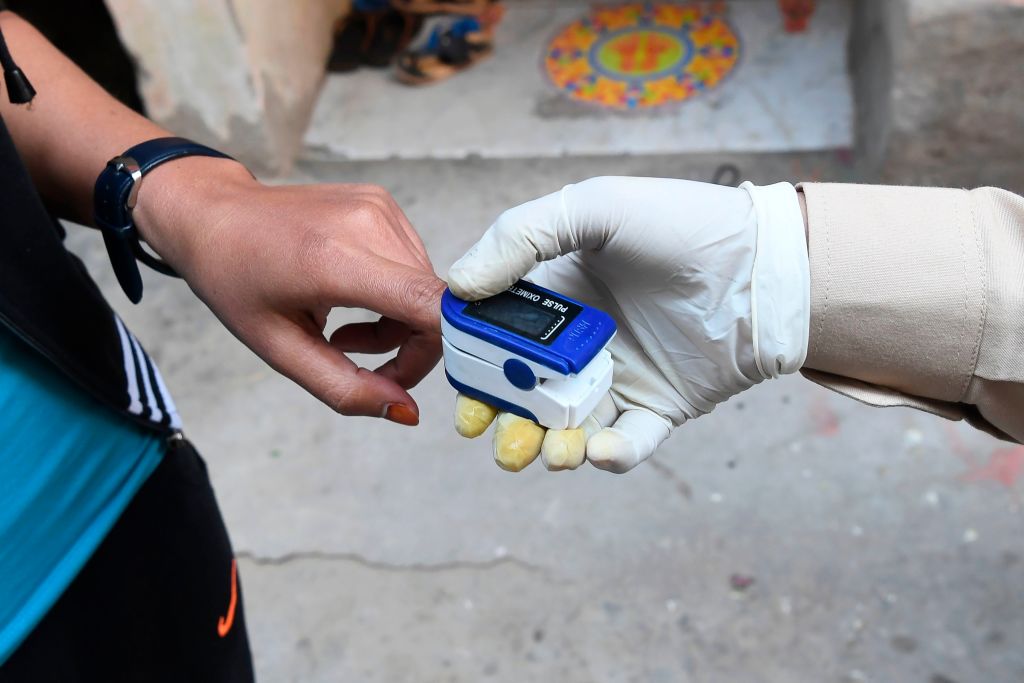In Azamgarh district of Uttar Pradesh, 55-year-old Gyanwati Devi quickly stops by the home of her supervisor in the evening to collect medicines. Earlier in the day, she visited 50 village households for a survey of people showing symptoms of illness, carefully noting down their names and advising them what to do. For over a year now, Devi, an accredited social health worker or ASHA, has been on the frontline in her community, responsible for door-to-door surveys to screen and track COVID-19—especially among returning migrant workers—providing medicine to isolating patients, and creating general awareness of the virus and how to prevent it. That morning, she had finally received test reports of her two sons and daughter-in-law. They were all COVID positive.
On April 19, both Devi and her son, Ajit, a primary school teacher, were on election duty as the state held Panchayat (village council) elections with 200,000 polling booths and almost 130 million registered voters.
From 6 a.m. to 6 p.m. that day, Devi was responsible for ensuring voters coming in had their hands sanitized, were masked, and maintained social distance. Days later, Ajit came down with a raging fever and began complaining of weakness and breathlessness.
“I’ve been doing this work for a while now, so I am no longer scared for myself. But watching my son sick made me anxious like never before,” Devi says. Over the past few days, various teacher unions have estimated that about 500 to 1,000 teachers and support staff have died due to COVID after being infected on polling duty. Devi thanks her stars that Ajit, who immediately began medication, is not one of them. But she cannot be relieved yet. Uttar Pradesh has been recording a rise in cases, in spite of testing delays, and the villages, including Devi’s, are heavily affected.
Devi received three face masks, one pair of gloves and a hand sanitizer from the government when the pandemic began in March last year. This year, there have been no additional distribution of safety gear for them. As India began its vaccination drive, Devi went door to door asking those eligible to vaccinate themselves. But rumors on social media were rife, and people were hesitant. “Some people would say, ‘I will die but not vaccinate myself’,” she recalls. “Now that they’re hearing of deaths, they all want to know how to receive the vaccine.” Devi is vaccinated, but a fellow ASHA worker who did not take the shot due to health complications is now seriously ill at home.
About 20 miles away, ASHA Sangini (supervisor) Kachan Pandey, is worried. She was on election duty at a counting center on May 2, where large crowds and lack of COVID protocol were on full display. When she visited the community health center for a meeting four days ago, she found all beds occupied. She is hearing of sick families and deaths every day. And yet, they have been provided only a few strips of medicines, like paracetamol and ivermectin, for distribution among the sick or isolating COVID patients. Oximeters and thermal scanners/infrared thermometers are in short supply. Pandey does not want the 20 ASHAs under her to continue surveys unless they’re fully equipped and provided with safety gear again. But she also understands that it’s a long fight. ASHAs across India went on strike last year demanding better pay, working conditions and the status of government employees.
A local official with whom Pandey shared her concerns asked her to be strong. “‘We have to work no matter what. Where can we run away to?’ he told me. So we either quit our jobs or we work. We choose work,” Pandey says.
Devi’s supervisor, Gyanti Yadav, shares similar concerns. It’s not easy to convince and facilitate so many people in these times, she says. “We are on the bottom rung. We have to live among the same people. Sometimes they reproach us, sometimes they verbally abuse us too. We have to bear everything and work,” Yadav says. In these dire times, there hasn’t been an opportunity to put forth their own concerns, financial and otherwise. “Our first duty is to save lives,” Yadav adds. “That’s what we are focused on.”



